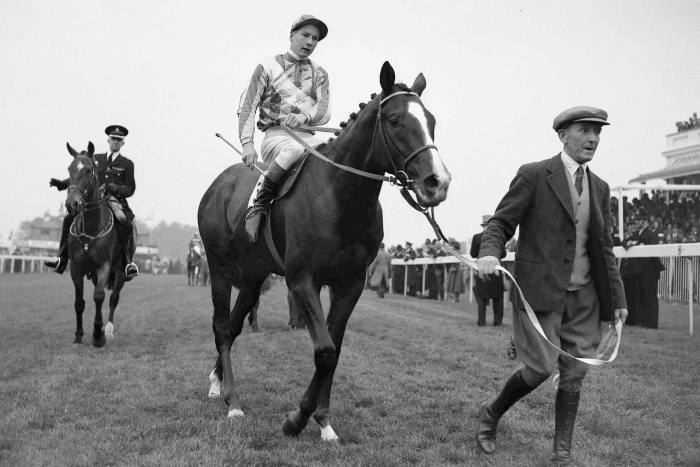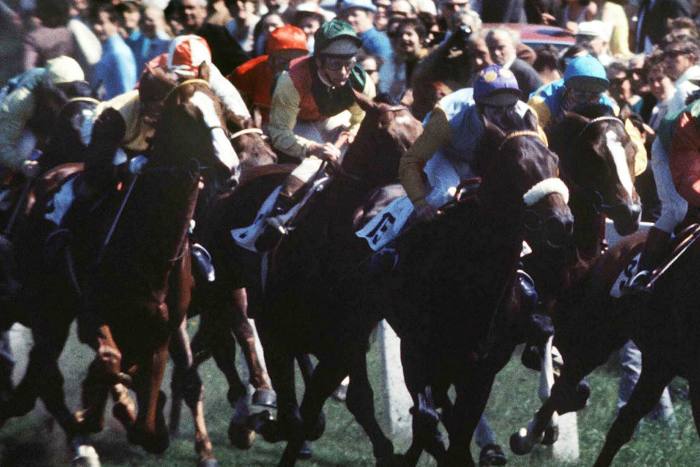Lester Piggott was a unique figure in the history of British horseracing: a turf celebrity who became as well known to the general public as he was to his own sporting audience.
Most of racing’s stars struggle to achieve any widespread recognition away from the track. But Piggott, who has died at the age of 86, was revered by owners, trainers, and regular punters alike for his brilliance in the saddle. A conviction for tax evasion in 1987 did not diminish public affection for him.
Nor did a ruthless professional approach dampen Piggott’s popularity with colleagues. He thought nothing of approaching a trainer with a view to replacing a weighing room rival in the saddle.

Piggott was bred to ride. He was born in Wantage in Oxfordshire in 1935, to Keith and Iris Piggott. His father rode over 500 winners as a jockey both on the flat and over the jumps, while his mother, herself an outstanding horsewoman from the famous Rickaby racing family, taught the couple’s only child to ride. Keith’s younger brother, Victor, was also a jockey and their father, Ernie, Lester’s grandfather, rode professionally too.

By the age of 12 Piggott was regularly exercising horses for his father, who by this time was a trainer. At the beginning of the 1948 flat season, Piggott was officially registered as an apprentice jockey to his father’s stable. That same year he rode his first winner.
Piggott had already been diagnosed as suffering from a hearing defect by this time. Although many cited this as the reason for his aloof manner, the jockey often remarked that his deafness proved no great handicap. He reasoned that most of what he missed in conversation was “not worth hearing anyway”.
Piggott’s brilliance in the saddle was obvious from his earliest rides. Very quickly, he became established as a rider in demand and this status was confirmed by success in the 1954 Derby on Never Say Die, at the age of 18. Piggott also attracted the attention of racecourse stewards and the Jockey Club Disciplinary Committee, which was less thrilled than the admiring betting public with the young rider’s will to win.
Piggott was banned from racing for six months after another ride on Never Say Die, less than two months after the partnership’s success in the Derby at Epsom. The punishment, for reckless riding, also included a ban on setting foot on any racecourse and in his father’s training yard.

Piggott returned early from his suspension, the severity of which many felt reflected the Jockey Club’s desire to teach the young rider a lesson. While still banned, the brilliant young horseman was offered the job of stable jockey to the trainer Noel Murless.
Piggott’s arrival at Murless’s Warren Place yard was the beginning of his big race monopoly. In partnership with the trainer, who was subsequently knighted, Piggott dominated the racing scene, earning the first of 11 jockeys’ championships in 1960.
The demand for Piggott’s services became so great he was able to break from Murless’s still powerful yard at the end of the 1966 flat season and ride as a freelance, unattached to any stable. He struck up a formidable partnership with the great Irish trainer Vincent O’Brien, which brought success at all the top meetings, especially Royal Ascot, and in all the top races. A total of four of Piggott’s nine Epsom Derby wins were supplied by O’Brien, starting in 1968 with Sir Ivor and finishing with The Minstrel, nine years later, when Piggott produced one of his great Epsom rides to get the colt home.
In between there was Nijinsky, whom Piggott rode in 1970 to the Triple Crown of the 2,000 Guineas at Newmarket, the Derby and the St Leger at Doncaster.

Amid all this domestic success, Piggott also enjoyed great success in the saddle abroad, on the continent and in Ireland, Hong Kong, Singapore and Australia, as well as America, where his upright style was the source of much bewilderment.
At the beginning of the 1980s, Piggott took up the offer to ride as stable jockey to Henry Cecil. This meant a return to Warren Place, where Cecil had taken over from Murless, his father-in-law. Piggott secured his tenth Jockeys’ championship in 1981 and his final title the following year with 188 winners, only three short of his seasonal career best of 191 in 1966. In 1985, he announced his intention to retire from riding at the end of the season, aged 50, to train and embarked on a lucrative worldwide farewell tour.
The following year, Piggott took out a licence to train. But the start of his training career coincided with the investigation into his tax affairs by the Inland Revenue, forerunner of HMRC. His conviction in October 1987 meant Piggott was once again headline news.

On leaving prison, in October 1988, Piggott eased back into racing life, helping his wife, Susan, who had taken over his training licence. The following spring, a bored Piggott was tempted back into the saddle by the offer to ride in Peru. He returned to full-time riding later that year when O’Brien suggested a comeback after watching Piggott ride in a veteran’s race. Piggott’s restoration was complete in November 1990 when he rode the O’Brien-trained Royal Academy to victory in the Breeders’ Cup Mile in front of a huge American crowd. Before retiring in 1995, Piggott claimed a 30th and final English classic win on Rodrigo de Triano in the 2,000 Guineas at Newmarket.
Piggott remained a public attraction in retirement, especially around Derby time when his views were eagerly sought by the public, and newspapers happy to pay for the privileged information. The media was especially interested in his domestic arrangements. He had married Susan, with whom he had two daughters, in 1960. But in 1993 he had a son from his relationship with Anna Ludlow, who worked as a personal assistant to Piggott.
There was to be one final involvement in a Derby winner. In 1996, William Haggas, a Newmarket trainer and Piggott’s son-in-law through his marriage to his daughter Maureen, asked for an opinion on whether the stable star Shaamit should take his chance in the Derby. Piggott rode the colt on the gallops and encouraged Haggas to let Shaamit take his chance. The horse duly ran and won. Piggott was again a winner at Epsom.

